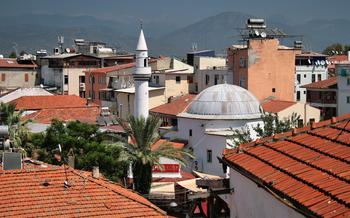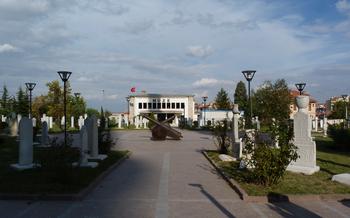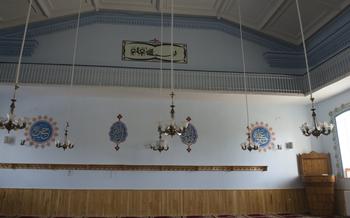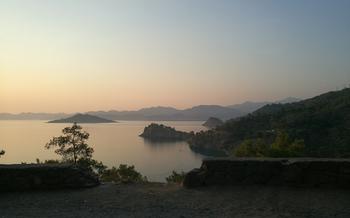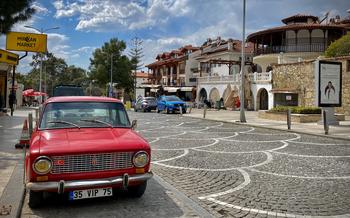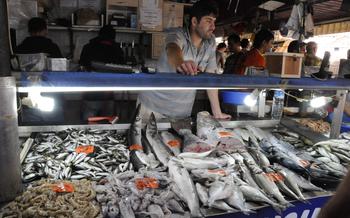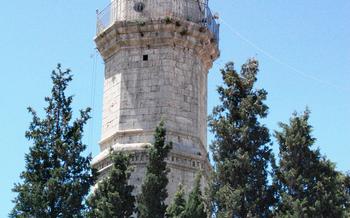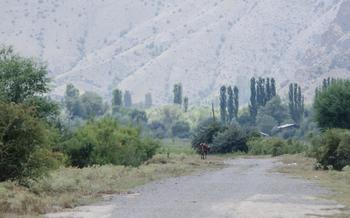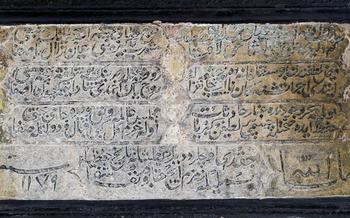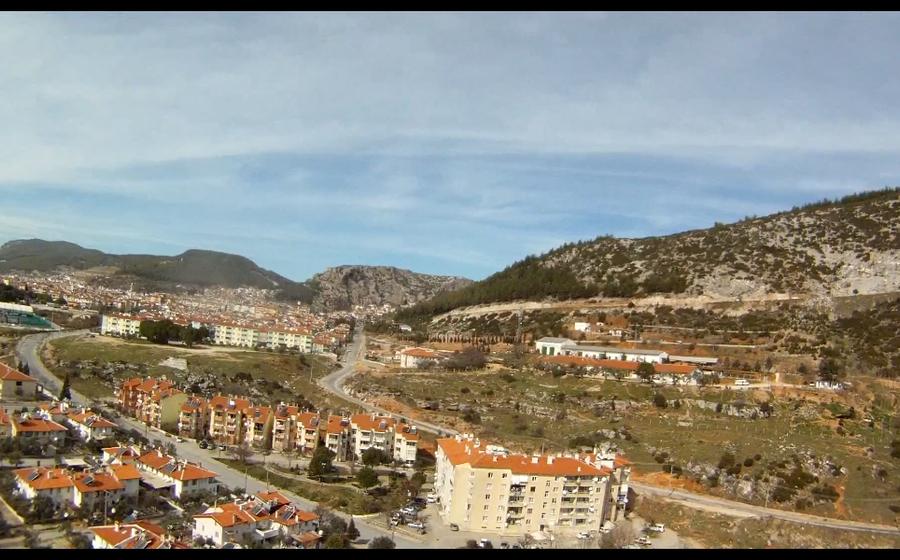
Fethiye Camii (Mosque)
- Fethiye Camii (Mosque): A Symbol of Faith and Architectural Beauty
- Historical Significance: A Legacy of the Ottoman Era
- Unique Architecture: A Blend of Cultures
- Intricate Interior: A Journey Through Devotion
- Location and Surroundings: A Tapestry of History
- Visiting the Mosque: A Guide for Travelers
- Spiritual Significance: A Place of Worship and Reflection
- Local Culture and Customs: Unveiling Traditions
- Photography and Videography: Capturing Memories
- Maintenance and Preservation: Ensuring Longevity
- Nearby Attractions: Exploring Fethiye's Treasures
- Local Cuisine: A Taste of Turkish Delights
- Shopping in Fethiye: From Souvenirs to Unique Crafts
- Accommodation in Fethiye: A Range of Options
- Insider Tip: Unveiling a Hidden Gem
Fethiye Camii (Mosque): A Symbol of Faith and Architectural Beauty
In the heart of Fethiye, nestled amidst a tapestry of history and culture, stands the Fethiye Camii (Mosque), a testament to the city's rich Ottoman heritage. Built in the 18th century, this architectural masterpiece is not just a place of worship but also a symbol of faith and devotion. The mosque's striking presence, with its elegant dome and towering minarets, draws visitors from far and wide, inviting them to delve into its spiritual and historical significance.
As you approach the mosque, a sense of tranquility envelops you, beckoning you to leave the bustling city behind and step into a realm of serenity. The mosque's exterior is a symphony of Islamic and Seljuk architectural styles, showcasing intricate stone carvings, decorative tiles, and graceful arches. The harmony of these elements creates a visually stunning facade that captivates the eye and sets the tone for the spiritual journey within.
The mosque's interior is equally mesmerizing, adorned with intricate details that reflect the devotion and craftsmanship of its builders. The mihrab, the niche indicating the direction of prayer, is a masterpiece of Islamic art, featuring intricate calligraphy and geometric patterns that draw the eye towards Mecca. The minbar, the pulpit from which the imam delivers sermons, is adorned with exquisite carvings, each detail symbolizing the mosque's rich history and religious significance.
The spacious prayer hall exudes a sense of serenity, conducive to contemplation and worship. The soft echoes of prayers reverberate through the vast chamber, creating an atmosphere of spirituality that touches the hearts of all who enter. The harmonious blend of architectural elements, the play of light and shadow, and the intricate craftsmanship combine to create a sacred space that invites visitors to connect with their faith and find solace within its walls.
Historical Significance: A Legacy of the Ottoman Era
The Fethiye Camii stands as a testament to the grandeur and architectural prowess of the Ottoman Empire. Its construction, spanning the years 1796 to 1803, was commissioned by Sultan Abdülhamid I, a prominent figure in Ottoman history. The mosque's completion marked a significant milestone in the expansion and influence of the empire throughout the region.
The mosque's design and construction were entrusted to skilled Ottoman architects and craftsmen, who drew inspiration from centuries of Islamic and Seljuk architectural traditions. The result was a masterpiece that showcased the empire's commitment to religious devotion and cultural heritage. The Fethiye Camii became a symbol of the Ottoman Empire's power and prosperity, serving as a place of worship, gathering, and spiritual guidance for the Muslim community.
Throughout its history, the mosque has witnessed numerous events and transformations that have shaped the region's cultural and religious landscape. It has served as a center for Islamic learning and scholarship, hosting religious ceremonies, festivals, and gatherings that brought people together in a spirit of community and devotion. The mosque's enduring legacy as a symbol of faith and architectural beauty continues to draw visitors and pilgrims from around the world, who come to marvel at its grandeur and experience the rich history it holds within its walls.
Unique Architecture: A Blend of Cultures
The Fethiye Camii showcases a mesmerizing blend of Islamic and Seljuk architectural elements, creating a unique and awe-inspiring structure. The mosque's exterior is adorned with intricate carvings and decorative tile work, reflecting the rich artistic traditions of the Seljuk Empire. The entrance portal, with its horseshoe-shaped arch and delicate floral motifs, is a testament to the craftsmanship of the era.
Inside the mosque, visitors are greeted by a spacious prayer hall that exudes a sense of serenity and devotion. The mihrab, the niche indicating the direction of Mecca, is a masterpiece of Islamic art, featuring intricate calligraphy and colorful tiles that seem to dance in the soft light filtering through the stained-glass windows. The minbar, the elevated platform used by the imam to deliver sermons, is adorned with intricate carvings depicting verses from the Quran, adding to the overall grandeur of the mosque.
The fusion of Islamic and Seljuk architectural elements is evident in every corner of the mosque, from the elegant domes that crown the structure to the delicate arches that frame the windows. The use of natural materials, such as stone and wood, adds a warm and inviting touch to the interior, creating a space that is both visually stunning and spiritually uplifting.
Intricate Interior: A Journey Through Devotion
The interior of the Fethiye Camii is a testament to the exquisite craftsmanship and devotion that went into its construction. The stunning mihrab, a niche in the wall indicating the direction of Mecca, is adorned with intricate tilework and calligraphy, drawing the eyes of worshippers towards the sacred space. The ornate minbar, or pulpit, stands tall and elegantly carved, serving as a platform for delivering sermons and religious teachings. The spacious prayer hall exudes a sense of tranquility and serenity, with its rows of prayer rugs creating a sea of colors and patterns. The acoustics within the mosque are remarkable, enhancing the recitation of prayers and creating a harmonious ambiance conducive to worship. The overall atmosphere within the Fethiye Camii is one of devotion, spirituality, and a deep connection with the divine.
Location and Surroundings: A Tapestry of History
The Fethiye Camii occupies a strategic position in the heart of Fethiye, a city steeped in historical allure. Its presence in the city center is a testament to its significance as a religious and cultural landmark. Surrounding the mosque are a treasure trove of historical landmarks that narrate the city's rich past. The Fethiye Museum, a short walk away, houses an impressive collection of artifacts that provide a glimpse into the region's ancient civilizations. The Fethiye Castle, perched atop a hill, offers panoramic views of the city, the mosque, and the breathtaking Mediterranean Sea.
Transportation to the mosque is convenient, with various options available. Public buses and taxis provide easy access from different parts of the city. For those who prefer a more leisurely approach, a scenic walk through the charming streets of Fethiye is a delightful way to reach the mosque.
In the vicinity of the mosque, visitors will find an array of attractions that complement their cultural exploration. The Fethiye Fish Market, just a stone's throw away, bustles with activity as local fishermen bring in their daily catch. The vibrant atmosphere and the mouthwatering aromas of freshly caught seafood make it a must-visit for culinary enthusiasts. The Fethiye Marina, with its lined restaurants and shops, offers a delightful spot to relax and soak in the vibrant ambiance of the city.
Visiting the Mosque: A Guide for Travelers
When visiting the Fethiye Camii, it is crucial to exhibit appropriate attire and respectful behavior. Conservative clothing is recommended, ensuring shoulders and knees are covered. For women, headscarves are not mandatory but are a sign of respect. Upon entering the mosque, remove your shoes and place them neatly in the designated shoe racks. Inside the prayer hall, maintain a respectful silence, avoiding loud conversations or disruptive behavior. Visitors are welcome to observe prayers from a designated area without disturbing the worshippers. Photography is permitted within the mosque, but it is essential to avoid using flash or capturing images of individuals without their consent. Remember, the mosque is an active place of worship, and respecting the sanctity of the space is paramount.
Spiritual Significance: A Place of Worship and Reflection
The Fethiye Camii stands as a sanctuary of faith, a locus of religious devotion for the Muslim community of Fethiye. In Islamic culture, the mosque holds immense significance, serving as a sacred space for prayer, contemplation, and spiritual connection with the divine. The mosque's serene ambiance, intricate architecture, and centuries-old history create an atmosphere conducive to worship and reflection.
Beyond its architectural grandeur, the Fethiye Camii is a living testament to the spiritual traditions and beliefs of the Muslim faith. The melodious call to prayer, echoing through the streets of Fethiye five times a day, summons the faithful to congregate within its hallowed halls. The mosque's spacious prayer hall, adorned with intricate carpets and soft lighting, provides a tranquil environment for worshippers to engage in their devotions, seeking solace, guidance, and communion with the Almighty.
The mosque's spiritual significance extends beyond its role as a place of worship. It serves as a community hub, a gathering place where Muslims from all walks of life come together to celebrate religious festivals, share communal meals, and seek knowledge and guidance from religious leaders. The mosque's imam, a respected figure in the community, plays a vital role in fostering spiritual growth and understanding among the faithful.
Visiting the Fethiye Camii offers a unique opportunity for travelers to gain insights into the spiritual heart of Islamic culture. By observing the rituals and traditions practiced within the mosque, visitors can develop a deeper appreciation for the faith's profound impact on the lives of its followers. The mosque stands as a symbol of unity, reminding visitors of the shared spiritual experiences that transcend cultural and linguistic boundaries.
Local Culture and Customs: Unveiling Traditions
The Fethiye Camii stands as a testament to the rich cultural heritage of Fethiye. Its existence is deeply intertwined with the customs and traditions of the local community. The mosque serves as a focal point for religious gatherings, fostering a sense of unity and belonging among the residents.
Cultural Sensitivity and Respect: When visiting the mosque, it is crucial to demonstrate cultural sensitivity and respect. This includes dressing appropriately, maintaining a respectful demeanor, and observing local customs. Visitors are encouraged to engage with the locals, asking questions and showing genuine interest in their way of life. Such interactions provide an opportunity for cultural exchange and a deeper understanding of the community's values and beliefs.
Preserving Local Traditions: The mosque plays a vital role in preserving and promoting local traditions. It hosts religious festivals, workshops, and events that showcase Turkish culture and heritage. These events provide a platform for locals to share their traditions, customs, and stories with visitors. By participating in these events, travelers can gain valuable insights into the diverse cultural fabric of Fethiye.
Unity and Diversity: The Fethiye Camii serves as a symbol of unity and diversity within the community. It is a place where people from all walks of life come together to worship, celebrate, and connect with one another. The mosque's inclusive environment encourages mutual respect, understanding, and cooperation among individuals of different backgrounds, fostering a sense of harmony and belonging.
Photography and Videography: Capturing Memories
When visiting the Fethiye Camii, the opportunity to capture the beauty of this architectural masterpiece through photography and videography presents itself. However, it is essential to approach this endeavor with respect and sensitivity, mindful of the sanctity of the space and the privacy of worshippers. While capturing the mosque's stunning exterior and intricate interior, it is important to avoid using flash photography, as this can be disruptive during prayer times. Additionally, it is advisable to seek permission from the mosque's caretakers or religious leaders before taking any photographs or videos within the prayer hall. By adhering to these guidelines, visitors can not only preserve the sacred atmosphere of the mosque but also share their experiences with others through visually compelling storytelling.
Maintenance and Preservation: Ensuring Longevity
The Fethiye Camii stands as a testament to the enduring legacy of Ottoman architecture and the deep-rooted faith of the Muslim community in Fethiye. Preserving this historic landmark requires ongoing maintenance and restoration efforts to ensure its longevity and continued significance for future generations.
The local community plays a vital role in safeguarding the mosque's heritage. They actively participate in fundraising initiatives, volunteer their time for cleaning and maintenance tasks, and advocate for the mosque's preservation. Their dedication ensures that the mosque remains a source of pride and inspiration for the people of Fethiye.
Regular maintenance and restoration projects are undertaken to address wear and tear, protect the mosque's structural integrity, and restore its original beauty. These efforts involve skilled artisans who employ traditional techniques and materials to maintain the authenticity of the mosque's design.
The preservation of the Fethiye Camii is not merely about maintaining a physical structure; it is about preserving a living legacy that represents the cultural, religious, and architectural heritage of the region. By ensuring its longevity, the community ensures that the mosque continues to serve as a place of worship, a symbol of faith, and a source of inspiration for generations to come.
Nearby Attractions: Exploring Fethiye's Treasures
Fethiye, a vibrant city nestled along Turkey's stunning Turquoise Coast, boasts an array of captivating attractions that complement a visit to the Fethiye Camii. History buffs can delve into the city's rich past at the Fethiye Museum, where ancient artifacts and captivating exhibits narrate the region's intriguing stories. Ascend to the majestic Fethiye Castle, a marvel of medieval architecture that crowns the city's skyline, offering breathtaking panoramic vistas. The castle's ramparts, once a defensive stronghold, now serve as a stage for cultural events and performances, immersing visitors in the city's vibrant cultural scene.
For a taste of Fethiye's authentic essence, wander through the bustling Fethiye Fish Market, a vibrant tapestry of colors, aromas, and lively banter. Witness the daily catch brought in by local fishermen, their weathered faces etched with tales of the sea. Engage with friendly vendors, haggle for the freshest produce, and savor the delectable flavors of freshly grilled seafood, a culinary delight that embodies the essence of Turkish coastal cuisine.
The Fethiye Marina, a picturesque harbor brimming with sleek yachts and traditional fishing boats, beckons visitors to explore its charming surroundings. Stroll along the promenade, lined with an array of inviting restaurants and boutiques, offering a delightful blend of culinary temptations and unique shopping experiences. As the sun dips below the horizon, the marina transforms into a vibrant social hub, where locals and tourists alike gather to bask in the enchanting ambiance and embrace the city's infectious energy.
Local Cuisine: A Taste of Turkish Delights
Fethiye's culinary scene is a vibrant tapestry of flavors, aromas, and colors, showcasing the rich heritage of Turkish cuisine. A visit to the city is incomplete without indulging in the local delicacies that have tantalized taste buds for centuries.
Must-Try Local Specialties
Among the must-try dishes in Fethiye is the mouthwatering "meze," a selection of small plates featuring an array of dips, salads, and appetizers. Sample the smoky eggplant salad, tangy hummus, and refreshing tzatziki, each bursting with unique flavors. For a hearty main course, savor the succulent grilled meats, such as kebabs and kofte, marinated in aromatic spices and cooked to perfection.
Influence of Turkish Cuisine
Turkish cuisine is renowned for its diverse influences, blending flavors from the Mediterranean, Middle Eastern, and Central Asian culinary traditions. In Fethiye, this fusion is evident in the use of fresh local ingredients, such as seafood, vegetables, and herbs, combined with traditional Turkish spices and cooking techniques. The result is a harmonious blend of flavors that delights the palate.
Supporting Local Artisans
By indulging in the local cuisine, you not only satisfy your taste buds but also contribute to the local economy and support the livelihoods of talented chefs, farmers, and artisans. Many restaurants in Fethiye are family-run businesses that have been passed down through generations, preserving culinary traditions and ensuring the freshest, most authentic dishes.
Food and Turkish Culture
In Turkish culture, food holds a significant place, symbolizing hospitality, generosity, and the joy of sharing. Whether dining at a local restaurant or enjoying a home-cooked meal, the emphasis is on savoring the moment, engaging in lively conversations, and creating lasting memories.
Shopping in Fethiye: From Souvenirs to Unique Crafts
Immerse yourself in the vibrant atmosphere of Fethiye's local markets and bazaars, where you can discover an array of handmade crafts and souvenirs that reflect the region's rich cultural heritage. From intricate carpets and textiles to hand-painted ceramics and jewelry, there's something for every taste and budget.
Haggling is not only acceptable but expected in these bustling marketplaces, so don't be afraid to engage in friendly bargaining with the vendors. It's a fun and interactive way to connect with the locals and score unique items at a great price.
As you stroll through the stalls, take the opportunity to learn about the artisans behind the crafts. Many of them are skilled craftsmen who have been practicing their trade for generations, and they're often happy to share their stories and techniques with interested visitors.
By supporting local artisans, you're not only taking home a piece of Fethiye with you but also contributing to the preservation of traditional crafts and the local economy. So, whether you're looking for a unique souvenir or simply want to experience the vibrant atmosphere of a Turkish bazaar, be sure to include a visit to Fethiye's markets in your itinerary.
Accommodation in Fethiye: A Range of Options
Fethiye offers a diverse range of accommodation options to cater to the needs and preferences of travelers. From luxurious hotels with stunning views to budget-friendly hostels and guesthouses, there's something for every traveler. Whether you seek comfort, affordability, or a local experience, you'll find suitable accommodations in Fethiye.
When choosing your accommodation, consider factors such as budget, desired amenities, and proximity to the Fethiye Camii and other attractions. If you prioritize comfort and convenience, opt for a hotel near the mosque that offers services like room service and concierge assistance. For a more immersive experience, choose a traditional guesthouse or bed and breakfast to connect with locals and learn about their culture.
To ensure a hassle-free stay, book your accommodation in advance, especially during peak tourist seasons. This will guarantee availability and allow you to secure the best rates. With its range of options, Fethiye offers a welcoming and comfortable base for your exploration of this vibrant city.
Insider Tip: Unveiling a Hidden Gem
As you explore the Fethiye Camii, take a moment to venture beyond the main prayer hall and discover a hidden treasure within the mosque's courtyard. Nestled amidst lush greenery and serene fountains, you'll find a small, secluded garden that offers a tranquil escape from the bustling city.
In this serene oasis, you can sit on one of the intricately carved benches, surrounded by fragrant flowers and the gentle sound of water trickling from the fountain. Take a deep breath and let the tranquility of the space wash over you, allowing your mind to find peace and tranquility.
This hidden gem is the perfect place to reflect on your visit to the mosque, to appreciate the beauty of Islamic architecture, and to connect with your spiritual side. So, when you're visiting the Fethiye Camii, don't miss the opportunity to explore this peaceful sanctuary and create your own unforgettable memory.
